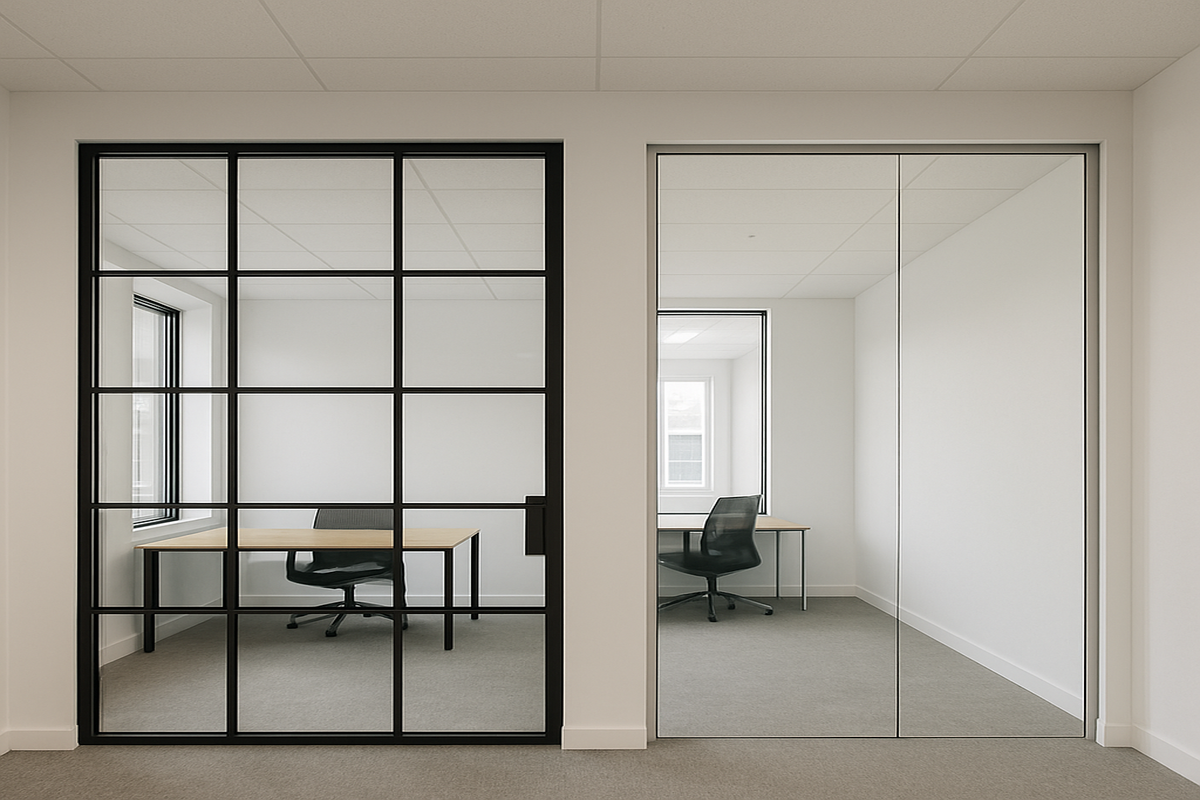
If you’re planning to divide your office space, you’ve likely come across two main options: frameless and framed office glass partitions. These solutions offer a sleek way to define areas without sacrificing natural light or the feeling of openness. But which one’s right for your business? In this guide, we compare the two options so you can make an informed decision based on design, cost, installation, and long-term use.
Frameless vs. Framed Glass Partitions – Key Differences
| Feature | Frameless Glass Partition | Framed Glass Partition |
| Appearance | Minimalist, sleek | Defined, structured |
| Cost | Higher | Lower |
| Installation | Custom-fit | Easier, modular |
| Acoustic Performance | Moderate | High |
| Flexibility | Low | High |
| Sustainability | Moderate | High with recyclable frames |
Which One Matches Your Office Aesthetic Better?
Both frameless glass partitions and framed glass partitions offer professional aesthetics but in different ways.
Frameless partitions provide a clean, modern look with minimal visual interruption. Ideal for high-end interiors where design takes centre stage.
Framed partitions add structure and definition and work well in more traditional or industrial-style office environments.
These design choices can influence how clients and employees perceive your workspace.
How Do Installation and Maintenance Compare?
Understanding the practical side of installing office glass partitions is essential before choosing a system.
Frameless Glass Partition:
- Requires precise installation and often uses floor-to-ceiling panels.
- Slightly more time-consuming to fit due to custom measurements.
- Minimal hardware equals to fewer places for dust but may need more careful handling.
Framed Glass Partition:
- Easier to install and can adapt to non-uniform surfaces.
- Aluminum or steel frames make for a more robust structure.
- Easier to replace or reconfigure sections as needed.
Thinking About Privacy and Acoustics?
- While glass is typically associated with openness, privacy is still achievable with the right design.
- Framed glass partitions can incorporate double glazing and acoustic seals more easily, offering better sound insulation.
- Frameless partitions can include frosted or smart glass but may not match framed systems in noise reduction.
- If acoustic privacy is a concern for meeting rooms or executive offices framed might be the safer bet.
Is Budget a Deciding Factor?
- Let’s talk numbers because your choice needs to make financial sense too.
- Framed glass partitions are generally more affordable and better for larger installations or tighter budgets.
- Frameless systems are more premium, and the cost can increase based on customisation, thicker glass, or specialist fittings.
- Think of framed partitions as practical and budget-conscious, while frameless systems are an investment in sleek office design.
What About Flexibility and Long-Term Use?
- Future-proofing your office matters, especially in evolving work environments.
- Framed partitions are often modular, making them easy to reconfigure if your team size or layout changes.
- Frameless options are typically fixed and harder to adjust without complete removal and reinstallation.
- So, if flexibility is high on your list, framed partitions offer more long-term adaptability.
Which Option Aligns with Sustainability Goals?
Sustainability is increasingly influencing office design choices.
- Framed partitions often use aluminum, a recyclable material that’s durable and long-lasting.
- Frameless glass partitions reduce material use but may require more frequent replacement of fittings.
Both options can contribute to eco-friendly office interiors, especially when sourced from suppliers with strong environmental practices.
FAQs
Yes, frameless glass partitions tend to cost more due to their custom nature and premium fittings.
They can be. Framed systems often allow for double glazing and acoustic seals, improving sound insulation.
Frameless partitions usually offer a cleaner, more modern aesthetic ideal for contemporary office designs.
Absolutely. Both framed and frameless partitions use toughened or laminated safety glass designed for commercial settings.
Yes, both systems can incorporate frosted, tinted, or patterned glass for added privacy and style.














